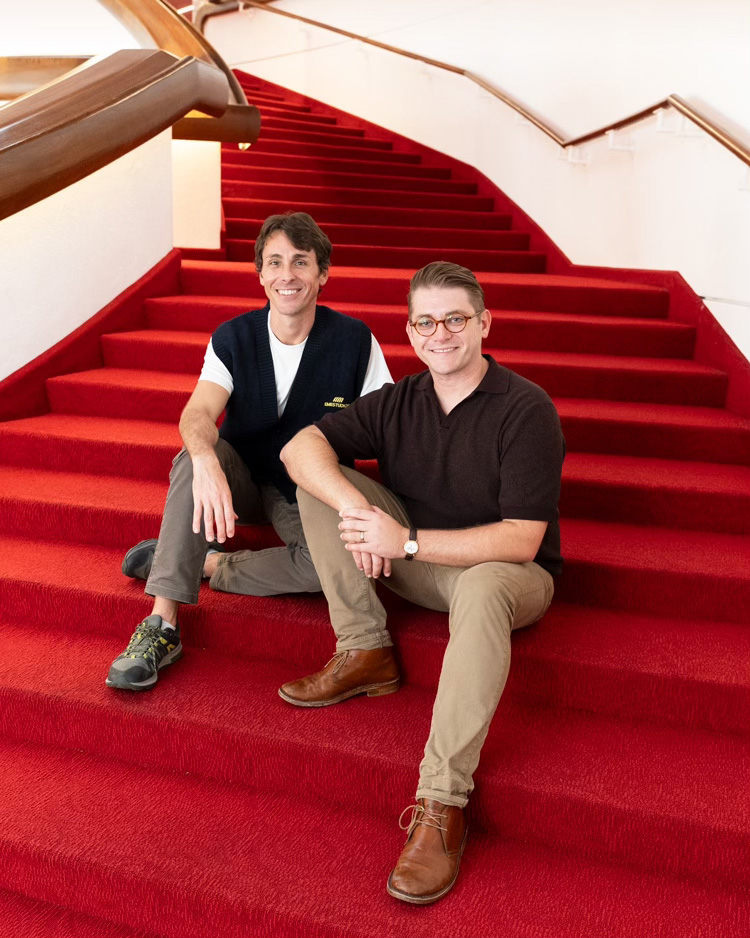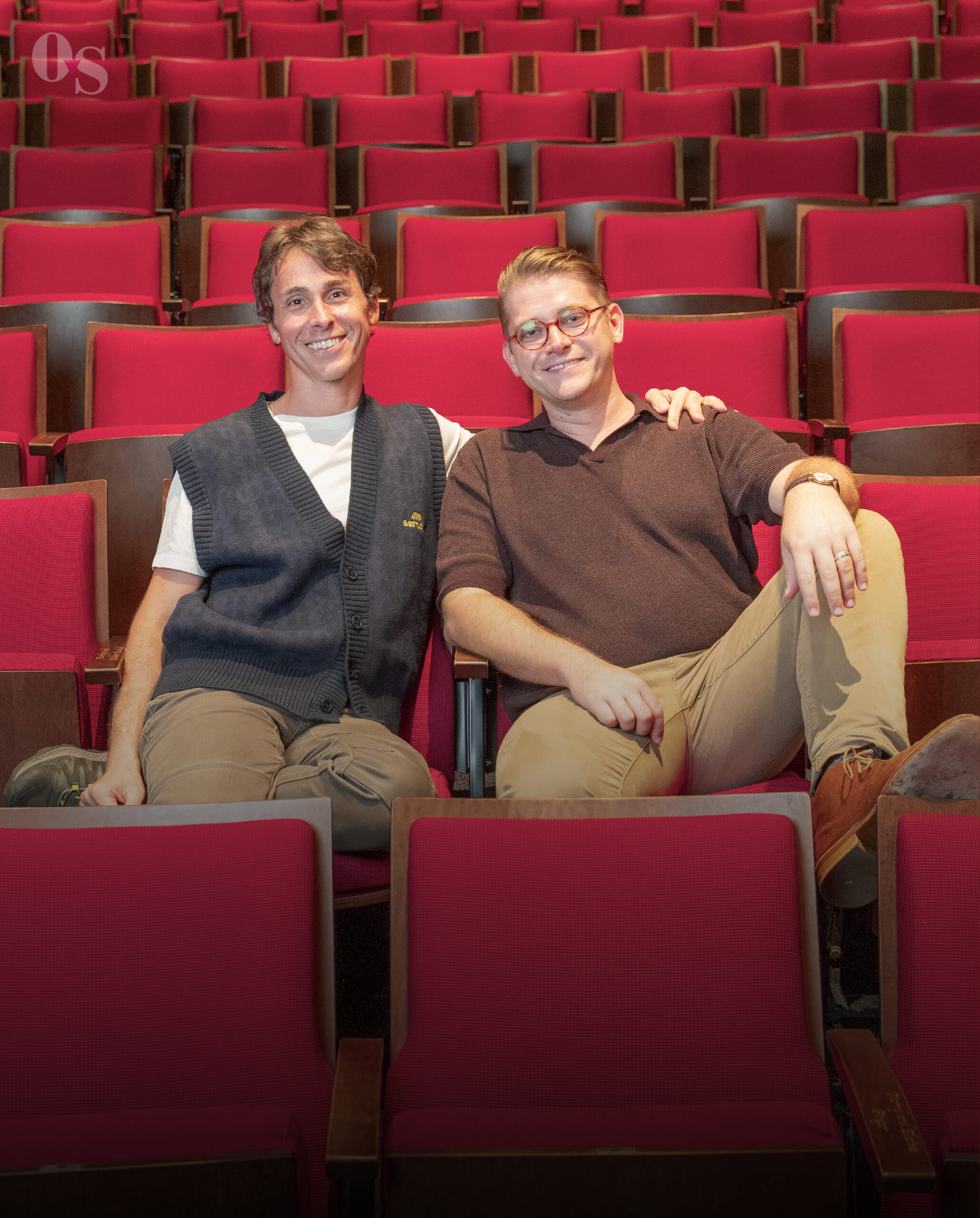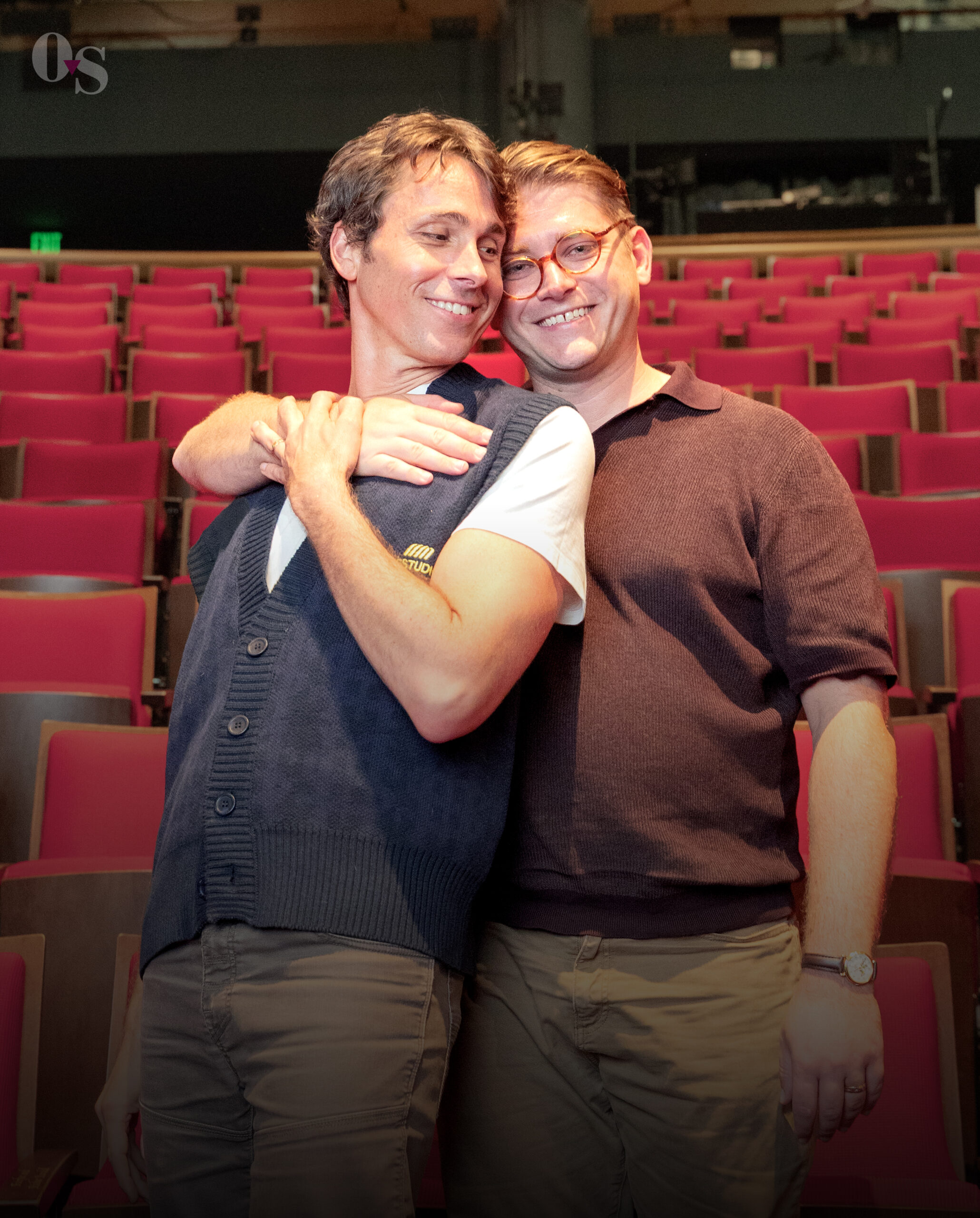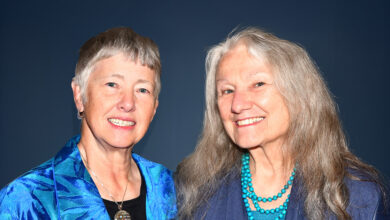Two Directors, One Love: Mitchell Greco and Brandon Weinbrenner
TUTS and Alley leaders juggle marriage, premieres, and holiday magic.

Mitchell Greco and Brandon Weinbrenner don’t just share a home—they share the same title. Both are associate artistic directors shaping Houston’s stages: Greco, newly appointed at Theatre Under The Stars, and Weinbrenner at the Alley Theatre. They first met at the Alley when Greco was performing in A Christmas Carol and Weinbrenner, then an assistant director, insisted on being noticed. Eleven years later—seven of them married—they’ve built parallel careers while building a life together. This season, Weinbrenner directs the world premiere of The Body Snatcher while Greco brings White Christmas to TUTS, proving that art and romance can thrive in tandem.
Ste7en Foster: How did you two meet?
Mitchell Greco: We met at the Alley back when I was still a performer. I was in a version of A Christmas Carol and Brandon was the assistant director.
Brandon Weinbrenner: At first he was totally oblivious to me. Didn’t understand why I was talking to him. I had to be very direct with him at one point.
OS: How long have you two been a couple?
BW: We’ve been together eleven years, and we’ve been married for seven.
MG: I think eight. Wait.
BW: Seven.
MG: We started dating in 2013. I’m not good at math, so whenever that was. We got married in 2018 at the Alley in the same room we met.

OS: So for all the sticklers in the room, that’s seven years. And what are your exact job titles for each of you?
BW: Associate artistic director of the Alley Theatre.
MG: I was associate artistic director for years at Stages and just started that same position at TUTS two weeks ago.
OS: Scoop!
MG: Yeah, this is brand new. But I’ve been involved in directing at TUTS for a while. Theatre Under The Stars gave me my very first professional job when I was in college. I thought then, and I still do, This is like Broadway. This is magic.
OS: What’s up next for each of you?
BW: I’m doing The Body Snatcher on the Neuhaus stage at the Alley Theatre, and it’s a world premiere about grave robbing by Katie Forgette. She’s a Seattle-based playwright who also wrote Sherlock Holmes and the Case of the Jersey Lily that I did three years ago. Mitchell is doing White Christmas.
MG: I think the holidays are a magical time, and I think bringing this classic story onstage to Houston, using Houston performers for Houston audiences, is just magical—I think something only TUTS can do in that way. This giant, old-fashioned musical with the original Irving Berlin score, full orchestra, Broadway sets—that’s the kind of work I’m drawn to, these random expressions of joy that I think Theatre Under The Stars does so well.

OS: How did the theater bug bite you?
BW: My mom. Quote me on that because—
MG: She’ll cry.
BW: She’ll cry. She’ll appreciate that. My mom is a theater gal, always has been. That’s what she majored in in college. I have a twin sister, and while the sister did sports, my mom put me in drama class. So ever since I was young, I was doing plays. And I was the bossy, know-it-all kid, so the director role fit me very well.
OS: And you, Mitchell?
MG: I grew up in a small town in central Texas about an hour from Austin, in a family where they loved college football, they loved hunting, they loved fishing. And that is so not like me. And my parents were so wonderful and supportive. “That’s okay if that’s what you don’t want to do. But what do you want to do?” So I turned to choir and then that turned into theater. I got into it as a way to express myself. I had a stutter growing up, so theater was my speech therapy. I never had a stutter on stage saying lines. And so it was a way, especially as a kid, that I could learn how to communicate and express myself.
OS: First date?
MG: Our first date was Hay Merchant.
BW: Yeah, may she rest in peace.
OS: Who proposed to whom?
BW: I proposed to him. Mitchell lived two years in Portland, Oregon. So when we got together we liked going back to Portland. It’s a great biking city. We were on our fourth trip to Portland and I had decided that this was going to be the trip that I proposed to him. I knew I wanted to put something on his finger. But we don’t wear a lot of jewelry, you know? In my mind, the ring was for the wedding. I didn’t want to get him a ring, but I wanted to put something on his finger. So I was like, I can get him a keychain and then I’ll put something meaningful on the keychain. So that found its way to being a bottle opener that I had engraved. And if there’s a bottle opener, I’ve gotta give him something to open. So I got him his favorite beer and put it my bag.
So we get to Portland and I’m immediately like, “Let’s get on our bicycles and go for a bike ride.” I was just so anxious. And he was, “We just got here. Why doesn’t he just want to relax?” But still I’m like “Okay, let’s go bike riding downtown.” Because I have this whole thing planned. So totally nice, right? So smart. So as we’re biking there on the Burnside Avenue Bridge and it’s like 90 degrees and it’s five o’clock and there’s traffic, I’m like, “You know, we could really use a beer right now. Here’s a beer, let’s whet your whistle.” And we stop on the bridge.
MG: And I’m hot and going, “What is happening?”
BW: And I say something like, “Well, you need a bottle opener to open that beer.” And he’s like, “Yes, I do!” Then I go and I get the little keychain that’s in the box and I get down on one knee to give him the keychain and propose to him. And he opens the box, and it’s empty. So Mitchell’s first words to me were, “What the fuck?” But then I found the keychain and he said, “Yes, and it’s too hot here.” And then we went to a tiki bar.
OS: Do you compare notes a lot, since you both have the same job but at different theaters?
BW: Always.
MG: Yeah.
BW: Why not? It’s the greatest resource. Mitchell’s work is great. This is someone with great taste, a great eye. I value his opinion more than anyone else’s.
OS: Would you say you’re both actors’ directors?
BW: Talking to an actor about their work—about their approach to the character—is equal parts fascinating and integral to shaping the choices they make that go into a cohesive production. The show doesn’t exist without them. They’re the ones out there every single night. The director’s work is not directly on display every night, but rather indirectly. My job is to influence, to guide the actors in their performance, the designers and their design for the production and, honestly, the audience and their experience, right? So it’s so much less about me than it is about the people who are present every night. And that’s why I think I’m an actor’s director.
MG: Ditto. I come from a similar background in that I was an actor first and then I switched to directing. But I have done acting, and I respect it. Being onstage and in a rehearsal room as an actor is a very vulnerable thing to do. And so I like to lead with that in mind. These are artists who are putting themselves on the line and opening themselves up to criticism. They’re bringing something personal to the space. I mean, these are human beings. We’re all working to put on a show, but them? You have to be very mindful of that, and not abuse the trust that actors have in their directors.
I think the one thing that directing has taught me, which has been useful in life, is to roll with the punches. You can plan your production, you can do all the meetings, you can try to work through every scenario, but when you get into the room, something has happened and you have to learn to be flexible and roll with it. I think it’s that adaptability. It’s that willingness to go with the flow, because the show must go on.
OS: Seems like the perfect line to end this conversation on. Thank you both!
BW: No, thank you.
MG: Thank you. This was fun.
For more info, visit alleytheatre.org and TUTS.org










